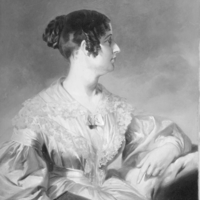The Mourner for the Barmecides
Fall’n was the House of Giafar; and its name,
The high romantic name of Barmecide,
A sound forbidden on its own bright shores,
By the swift Tygris’ wave. Stern Haroun’s wrath,
Sweeping the mighty with their fame away,
Had so pass’d sentence: but man’s chainless heart
Hides that within its depths which never yet
Th’ oppressor’s thought could reach.
’Twas desolate
Where Giafar’s halls, beneath the burning sun,
Spread out in ruin lay. The songs had ceas’d;
The lights, the perfumes, and the genii-tales
Had ceas’d; the guests were gone. Yet still one voice
Was there–the fountain’s; thro’ those eastern courts,
Over the broken marble and the grass,
Its low clear music shedding mournfully.
And still another voice!–an aged man,
Yet with a dark and fervent eye beneath
His silvery hair, came day by day, and sate
On a white column’s fragment; and drew forth,
From the forsaken walls and dim arcades,
A tone that shook them with its answering thrill
To his deep accents. Many a glorious tale
He told that sad yet stately solitude,
Pouring his memory’s fulness o’er its gloom,
Like waters in the waste; and calling up,
By song or high recital of their deeds,
Bright solemn shadows of its vanish’d race
To people their own halls: with these alone,
In all this rich and breathing world, his thoughts
Held still unbroken converse. He had been
Rear’d in this lordly dwelling, and was now
The ivy of its ruins, unto which
His fading life seem’d bound. Day roll’d on day,
And from that scene the loneliness was fled;
For crowds around the grey-hair’d chronicler
Met as men meet, within whose anxious hearts
Fear with deep feeling strives; till, as a breeze
Wanders thro’ forest branches, and is met
By one quick sound and shiver of the leaves,
The spirit of his passionate lament,
As thro’ their stricken souls it pass’d, awoke
One echoing murmur.–But this might not be
Under a despot’s rule, and, summon’d thence,
The dreamer stood before the Caliph’s throne:
Sentenced to death he stood, and deeply pale,
And with his white lips rigidly compress’d;
Till, in submissive tones, he ask’d to speak
Once more, ere thrust from earth’s fair sunshine forth.
Was it to sue for grace?–His burning heart
Sprang, with a sudden lightning, to his eye,
And he was changed!–and thus, in rapid words,
Th’ o’ermastering thoughts, more strong than death, found way.
‘And shall I not rejoice to go, when the noble and the brave,
With the glory on their brows, are gone before me to the grave?
What is there left to look on now, what brightness in the land?–
I hold in scorn the faded world, that wants their princely band!
’My chiefs! my chiefs! the old man comes that in your halls was nurs’d,
That follow’d you to many a fight, where flash’d your sabres first;
That bore your children in his arms, your name upon his heart:–
Oh! must the music of that name with him from earth depart?
‘It shall not be!–a thousand tongues, tho’ human voice were still,
With that high sound the living air triumphantly shall fill;
The wind’s free flight shall bear it on, as wandering seeds are sown,
And the starry midnight whisper it, with a deep and thrilling tone.
‘For it is not as a flower whose scent with the dropping leaves expires,
And it is not as a household lamp, that a breath should quench its fires;
It is written on our battle-fields with the writing of the sword,
It hath left upon our desert-sands a light in blessings pour’d.
‘The founts, the many gushing founts, which to the wild ye gave,
Of you, my chiefs, shall sing aloud, as they pour a joyous wave!
And the groves, with whose deep lovely gloom ye hung the pilgrim’s way,
Shall send from all their sighing leaves your praises on the day.
‘The very walls your bounty rear’d for the stranger’s homeless head,
Shall find a murmur to record your tale, my glorious dead!
Tho’ the grass be where ye feasted once, where lute and cittern rung,
And the serpent in your palaces lie coil’d amidst its young.
‘It is enough! mine eye no more of joy or splendour sees,
I leave your name in lofty faith, to the skies and to the breeze!
I go, since earth her flower hath lost, to join the bright and fair,
And call the grave a kingly house, for ye, my chiefs, are there!’
But while the old man sang, a mist of tears
O’er Haroun’s eyes had gathered, and a thought–
Oh! many a sudden and remorseful thought–
Of his youth’s once-lov’d friends, the martyr’d race,
O’erflow’d his softening heart.–'Live! live!' he cried,
‘Thou faithful unto death! live on, and still
Speak of thy lords; they were a princely band!’

